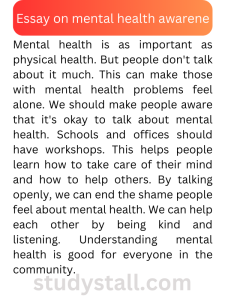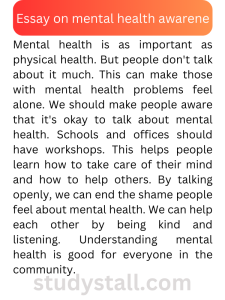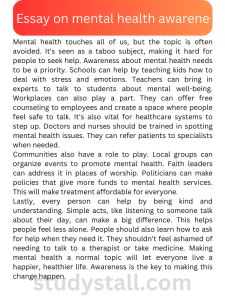Mental health is an essential aspect of our overall well-being and should be given the same level of importance as physical health. It encompasses our emotional, psychological, and social well-being, affecting how we think, feel, and act. Mental health awareness is crucial in understanding and addressing the prevalence of mental illnesses and promoting a positive and supportive environment for individuals struggling with their mental health. In this essay, we will delve into the significance of mental health awareness and explore various ways to improve it within society.
Mental Health Awareness (100 Words)
Mental health is as important as physical health. But people don’t talk about it much. This can make those with mental health problems feel alone. We should make people aware that it’s okay to talk about mental health. Schools and offices should have workshops. This helps people learn how to take care of their mind and how to help others. By talking openly, we can end the shame people feel about mental health. We can help each other by being kind and listening. Understanding mental health is good for everyone in the community.
Mental Health Awareness (200 Words)
Mental health matters, but many don’t realize its importance. People are often afraid to talk about their feelings or problems. They fear they will be judged. This silence can lead to bigger issues. Making people aware about mental health is the first step to solving this problem. We can use social media, schools, and community events to spread the word. Doctors should also be trained to see signs of mental health issues. They can then guide patients to get the right help. Families play a role too. Parents should talk to their kids about mental health from a young age. This makes kids more comfortable talking about their feelings. Breaking the silence helps everyone understand that mental health is a part of life. It needs attention and care, just like our bodies.
Mental Health Awareness (300 Words)
Mental health touches all of us, but the topic is often avoided. It’s seen as a taboo subject, making it hard for people to seek help. Awareness about mental health needs to be a priority. Schools can help by teaching kids how to deal with stress and emotions. Teachers can bring in experts to talk to students about mental well-being. Workplaces can also play a part. They can offer free counseling to employees and create a space where people feel safe to talk. It’s also vital for healthcare systems to step up. Doctors and nurses should be trained in spotting mental health issues. They can refer patients to specialists when needed.
Communities also have a role to play. Local groups can organize events to promote mental health. Faith leaders can address it in places of worship. Politicians can make policies that give more funds to mental health services. This will make treatment affordable for everyone.
Lastly, every person can help by being kind and understanding. Simple acts, like listening to someone talk about their day, can make a big difference. This helps people feel less alone. People should also learn how to ask for help when they need it. They shouldn’t feel ashamed of needing to talk to a therapist or take medicine. Making mental health a normal topic will let everyone live a happier, healthier life. Awareness is the key to making this change happen.
The Importance of Mental Health Awareness
Mental illnesses are more common than we may realize, with millions of people worldwide experiencing various mental health disorders. However, there is still a significant stigma surrounding mental health, which often prevents individuals from seeking help and support. Mental health awareness aims to break down these barriers and educate society about different mental health conditions, reducing stigma, and encouraging early intervention and treatment.
- Promoting Understanding: Increasing mental health awareness helps society understand that mental health issues are not a sign of weakness or personal failure. It emphasizes that mental illnesses are legitimate medical conditions that can affect anyone, regardless of age, gender, or background.
- Fostering Empathy and Support: By spreading awareness about mental health, we foster empathy and understanding among individuals. This enables a supportive and compassionate environment, where individuals can openly discuss their mental health struggles without fear of judgment or discrimination.
- Encouraging Early Detection and Treatment: When people are aware of the signs and symptoms of mental illnesses, they can recognize them in themselves or others. Early detection and intervention are vital for preventing the escalation of mental health issues and improving long-term outcomes.
- Reducing Stigma and Discrimination: Mental health awareness challenges the misconceptions and biases associated with mental illnesses. By educating society, we can combat the stigma and discrimination faced by individuals struggling with their mental health, facilitating their integration into society.
Ways to Improve Mental Health Awareness
To enhance mental health awareness, a multi-faceted approach is necessary. Here are some effective strategies to foster mental health awareness within society:
1. Education and Awareness Campaigns
Education is a powerful tool for promoting mental health awareness. Schools, workplaces, and communities should implement comprehensive mental health education programs that cover various mental health disorders, their causes, symptoms, and available treatment options. These programs should also emphasize the importance of seeking help and offer guidance on where to find support.
2. Open Conversations and Supportive Environments
Creating an open dialogue about mental health is crucial in reducing stigma and encouraging individuals to seek help. Organizations and communities can organize events, forums, and support groups where people can share their experiences, challenges, and triumphs related to mental health. This fosters a sense of belonging, support, and understanding.
3. Collaborations and Partnerships
Collaboration between government agencies, healthcare providers, and non-profit organizations can significantly amplify mental health awareness efforts. By pooling resources, these partnerships can organize awareness campaigns, offer free or low-cost mental health services, and advocate for mental health policies and regulations.
4. Media and Social Media
The media, including television, radio, and online platforms, play a crucial role in shaping public opinion and influencing societal attitudes. Partnering with media outlets to raise awareness through documentaries, articles, interviews, and social media campaigns can have a far-reaching impact on mental health awareness.
5. Training and Support for Professionals
Healthcare professionals, educators, and employers should receive training on mental health awareness, identifying signs of mental illnesses, and providing appropriate support. This equips them with the knowledge and skills to recognize and respond sensitively to individuals struggling with their mental health.
6. Government Policies and Funding
Governments should prioritize mental health by allocating funds and resources towards mental health services, research, and awareness programs. Implementing policies that protect the rights of individuals with mental illnesses and promote inclusive workplaces and communities is also essential.
Conclusion
Mental health awareness is a crucial step towards building a society that supports and understands the needs of individuals with mental health conditions. By promoting understanding, empathy, and early intervention, we can reduce stigma, encourage help-seeking behavior, and provide the necessary resources and support for those in need. Through education, open conversations, collaborations, media influence, training, and government initiatives, we can collectively work towards creating a society that prioritizes mental health and well-being for all.
FAQ
- Why is mental health awareness important?
- Mental health awareness is important because it helps society understand that mental health issues are not a sign of weakness or personal failure. It emphasizes that mental illnesses are legitimate medical conditions that can affect anyone, regardless of age, gender, or background.
- How does mental health awareness foster empathy and support?
- Mental health awareness fosters empathy and support by spreading knowledge and understanding about mental health. This creates a compassionate environment where individuals can openly discuss their mental health struggles without fear of judgment or discrimination.
- Why is early detection and treatment encouraged in mental health awareness?
- Early detection and treatment are encouraged in mental health awareness because they are vital for preventing the escalation of mental health issues and improving long-term outcomes. When people are aware of the signs and symptoms of mental illnesses, they can recognize them in themselves or others.
- What is the role of mental health awareness in reducing stigma and discrimination?
- Mental health awareness plays a crucial role in reducing stigma and discrimination associated with mental illnesses. By educating society, it challenges misconceptions and biases, facilitating the integration of individuals struggling with their mental health into society.
